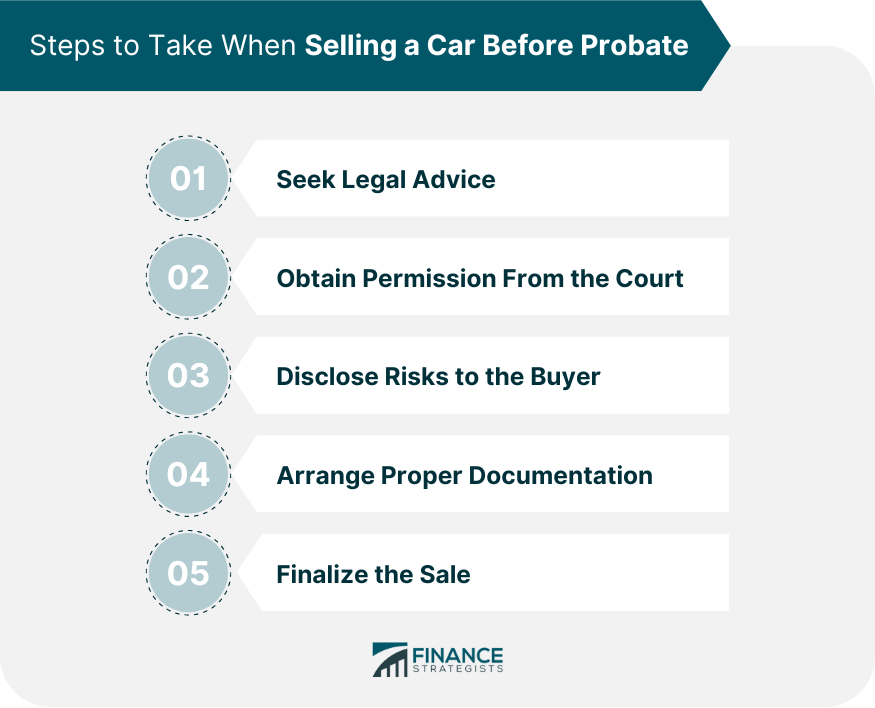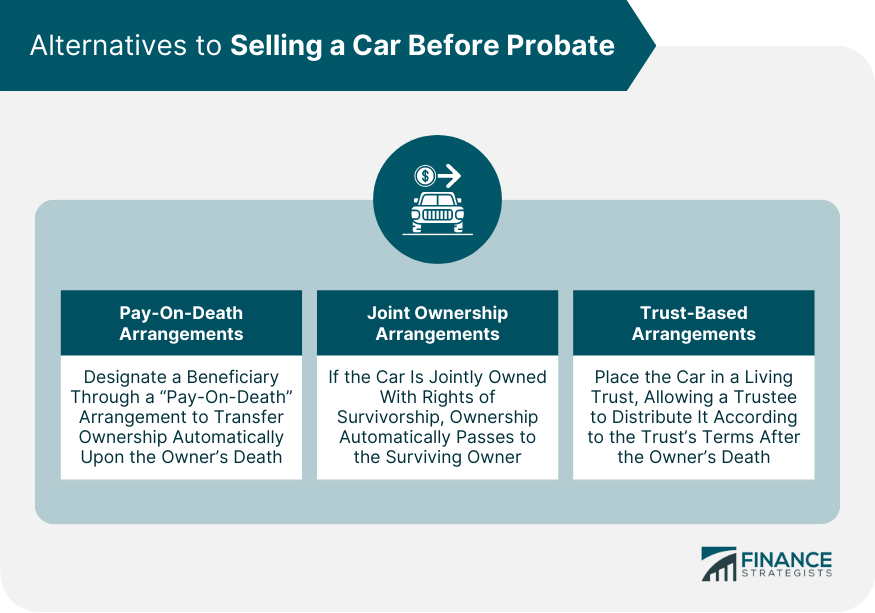Selling a car before probate is typically not permitted. Probate is the legal process by which a deceased person's estate is settled, their debts paid, and assets distributed according to their will. Selling a car before probate could be deemed illegal, as the vehicle technically belongs to the deceased's estate. Exceptions may exist, depending on the jurisdiction, but generally require compelling reasons and court approval. Circumventing probate can lead to serious consequences including legal disputes, financial penalties, and potentially criminal charges. Always consult with a legal professional when dealing with estate matters to avoid potential complications. Probate plays a crucial role in transferring car ownership from the deceased to the new owner. Without probate, the car technically still belongs to the deceased person's estate. Therefore, selling the car without going through probate could be considered illegal because the seller does not officially own the car. Furthermore, the repercussions of selling a car without probate can be severe. Potential consequences include legal disputes, financial penalties, and in extreme cases, criminal charges. This is because the sale may be viewed as an attempt to defraud creditors or beneficiaries of the estate. The very first step is to consult with a legal professional, ideally, an attorney who specializes in probate law. They can provide valuable advice specific to your jurisdiction and your unique situation. Navigating the probate process can be complex and challenging, so getting expert advice is crucial to avoid potential legal pitfalls. In some situations, selling a car before probate might be necessary—for instance, to settle estate debts or if the car's value might depreciate over time. In such cases, you can petition the court for permission to sell the car. Transparency is key when dealing with potential buyers. If you sell the car before probate is complete, the buyer may face legal challenges when obtaining a clear title to the car. You should disclose this risk to any prospective buyer and ensure they understand the implications. Prepare all necessary documentation for selling the car. This includes the vehicle title, maintenance records, and any documentation related to the estate or probate process. Once you have taken the previous steps, you can finalize the sale. It’s always a good idea to seek legal advice when finalizing the sale contract to ensure all details are correctly addressed, and both parties are adequately protected. The executor of an estate plays a pivotal role in managing the deceased's assets, including selling a car. However, the executor must adhere to legal procedures and responsibilities, which usually involve waiting until probate is completed before selling assets. Yet, in certain cases, an executor can request the court for permission to sell assets before probate. The court might grant such a request if the sale benefits the estate, for example, by preventing depreciation or paying off debts. Nevertheless, the executor cannot arbitrarily decide to sell assets without court approval. Ignoring the rules of probate can lead to serious legal consequences. These range from civil implications, such as being sued by the estate's beneficiaries, to potential criminal charges if the sale is deemed fraudulent. Consider the hypothetical case of John, who sells his deceased father's car before probate. His siblings, who are the rightful beneficiaries, can sue him for misappropriating the estate's assets. If found guilty, John would have to compensate his siblings and might also face penalties. In more severe cases, if the court determines that the sale was intended to defraud creditors or beneficiaries, the seller could face criminal charges. It's crucial to understand the implications fully before making any decisions about selling a car before probate. If the need to sell a car arises before probate has been granted, there are alternatives that can circumvent legal problems. Here are a few options: In several jurisdictions, a car owner can make a "pay-on-death" (POD) arrangement, where they designate a beneficiary who will automatically own the vehicle upon the owner's death. This bypasses probate because the car does not become part of the deceased's estate. If the car is owned jointly with rights of survivorship, ownership of the car automatically passes to the surviving owner upon death. This arrangement also bypasses probate, as the car doesn't become part of the deceased's estate. Placing the car in a living trust is another option. In this scenario, the car is owned by the trust and managed by a trustee. Upon the owner's death, the trustee is legally obliged to distribute the car according to the terms of the trust, circumventing probate. The sale of a car before probate can be a complex legal issue. As a general rule, it is not permitted due to the legalities of asset distribution and ownership rights. However, specific exceptions might apply, such as if court approval is granted, which typically requires a compelling reason. Transparency with potential buyers and the need for correct documentation are crucial. Moreover, the executor plays a significant role in managing the deceased's assets and must adhere to strict legal procedures. The consequences of breaching probate rules can range from lawsuits to criminal charges. Various alternatives, like pay-on-death arrangements, joint ownership, and trust-based arrangements, can facilitate the process without going through probate. Always consult with a legal professional when navigating such complex issues to ensure you are complying with all legal requirements.Can I Sell a Car Before Probate?
Importance of Probate in Vehicle Sales
Steps to Take When Selling a Car Before Probate
Seek Legal Advice
Obtain Permission From the Court
Disclose Risks to the Buyer
Arrange Proper Documentation
Finalize the Sale

Role of an Executor in Selling a Car
Legal Consequences of Selling a Car Before Probate
Alternatives to Selling a Car Before Probate
Pay-On-Death Arrangements
Joint Ownership Arrangements
Trust-Based Arrangements

Conclusion
Can I Sell a Car Before Probate? FAQs
No, selling a car before probate can have legal consequences, including potential civil disputes, financial penalties, and even criminal charges.
In some cases, you may be able to sell a car before probate with court approval, but this typically requires a compelling reason and legal permission.
If you want to sell a car before probate, consult with a probate attorney, obtain permission from the court if necessary, disclose the risks to the buyer, and ensure proper documentation and legal advice throughout the process.
The executor of an estate usually needs to wait until probate is completed before selling assets. However, in certain situations, the executor can request court permission to sell assets before probate, provided it benefits the estate and is approved by the court.
Yes, alternatives to selling a car before probate include pay-on-death arrangements, joint ownership arrangements with rights of survivorship, and placing the car in a living trust to bypass probate.
True Tamplin is a published author, public speaker, CEO of UpDigital, and founder of Finance Strategists.
True is a Certified Educator in Personal Finance (CEPF®), author of The Handy Financial Ratios Guide, a member of the Society for Advancing Business Editing and Writing, contributes to his financial education site, Finance Strategists, and has spoken to various financial communities such as the CFA Institute, as well as university students like his Alma mater, Biola University, where he received a bachelor of science in business and data analytics.
To learn more about True, visit his personal website or view his author profiles on Amazon, Nasdaq and Forbes.















